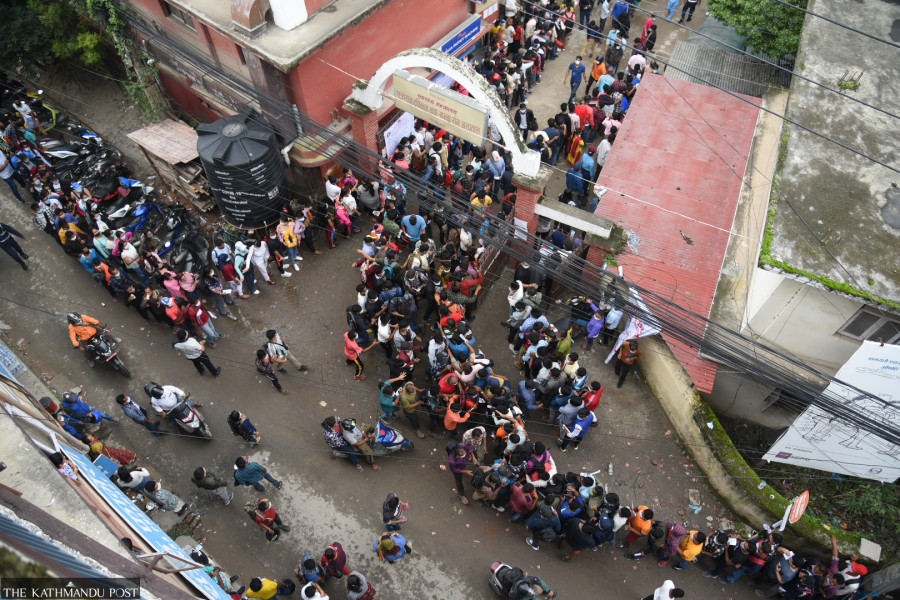Columns
The epidemic of misgovernance
At the core of our national suffering is political mismanagement.
Mohan Guragain
Nepalis have had enough trouble in the past eight years or so, more than what they can possibly tolerate. Lest we forget, an earthquake struck us hard on April 25, 2015. The deadly M7.8 blow and its unrelenting aftershocks killed nearly 9,000 Nepalis and rendered tens of thousands homeless in poorly built rural mountain settlements. Then came India’s border blockade later that year when Nepal decided not to dilly-dally with its new constitution.
More recently, starting in early 2020, the waves of the Covid-19 pandemic came crashing on us, killing thousands more people than the earthquake. The contagion may have subsided but the economic hardships inflicted by years of curbs on physical movement and social contact still refuse to go.
At the core of this built-up national suffering is political mismanagement. External elements can cause disruptions in national life, but domestic politics should take care of them.
When the earthquake hit, Nepal’s neighbours and friendly countries further off swiftly mobilised to rescue a nation shaken by the disaster. Mismanagement in Kathmandu then was such that aid groups from the South, the North and across the oceans mostly operated on their own whims. New Delhi perhaps read too much into Nepal’s ad hoc measures, as it had no hesitation to blockade a country only limping from the terrible blow of the Gorkha quake.
Our politicians then managed to fend off the overconfident babus of Delhi’s officialdom by ignoring Narendra Modi’s message for delaying the promulgation of the new Nepali constitution as elections loomed in Indian states close to Nepal. However, the flaws in our hastily pushed charter have only been magnified over time. The constitution has loopholes everywhere—from federal government formation and inclusion mandates to Parliament dissolution, despite the Constitutional Bench having handled a few related cases already.
The Covid-19 pandemic exposed our ineptitude in emergency management, and we continue to see its effects in the economy. The confusion prevailing in the trade and economic sector has global connections, but the failure to draw up workable strategies and put them to good use is very much our national deficiency. The KP Sharma Oli administration drew fierce criticism from the public for failing to find urgent measures to respond to the pandemic. That the whole world was at a loss for ways to treat those taken ill with coronavirus and tame the deadly contagion should be no cover-up for our incompetency.
The West and the East, particularly China, where the virus is considered to have originated, were poles apart when it came to tactics to deal with the killer flu. While Beijing clamped down crippling lockdowns, much of the world close to it followed suit, but Europe and the United States believed that the virus wave subsidies only once it had swept the entire population, wreaking destruction in the process.
In a country with limited resources and know-how, Nepali rulers probably thought then that confining people to their neighbourhoods was the best way to save lives. How the administration of the day fumbled to provide testing and to ensure the supply of daily essentials is best forgotten, except that unpleasant memories keep haunting.
What’s more frustrating for the hapless public is that lessons are never learnt, and malpractices continue to plague the state machinery even after regimes change. The period of missed governance under the watch of Sher Bahadur Deuba may be overlooked for the fact that the Nepali Congress leader oversaw the crucial polls that elected the current legislatures in Kathmandu and in the provinces. Installed in Singhadurbar by a mandamus order of the Supreme Court in the backdrop of Oli’s twin attempts at dissolving the House of Representatives, Deuba shut all his eyes and ears to what lay bare before him and critics’ calls for care. All he did was juggle his five-party coalition of odd forces and as ministers brushed public concerns aside in their hunt for resources to fund their parties’ costly electoral campaigns. The corrupt deals that Deuba’s coterie engaged in threaten to be renewed as Congress finds its space in government again.
Our reigning Supremo, Pushpa Kamal Dahal, the no-more-fearsome ‘Prachanda’ charged with insurgency-era crimes at the top regular court as the transitional justice process lies sick in the corridor of power, changed partners even before his honeymoon period was over. To defang Oli, who reared his head from behind the seat of power, Dahal embraced Deuba and Madhav Kumar Nepal, who waited for an opportune time to oust Oli. After all, Oli had undone their electoral knot while making Dahal, the leader of the third-largest party in the House, the chief executive. The new lunch partners of Baluwatar spent some crucial weeks dishing out the ministries.
Even as the Cabinet gets full shape, we cannot expect the firefighting premier to fix what’s gone wrong with the country. Clouds of threat over conflict-era criminal prosecution at home and away, a teetering economy, and a financial system on the brink of collapse blur the prime minister's vision. He's so fixated on securing a landing permit at New Delhi's Indira Gandhi airport that he put the Chinese invite to the Boao Forum for Asia under the pillow. Bitten once for his first flight out of Kathmandu to attend the Beijing Olympics in 2008, Dahal, this time, has doubled up his effort to make the South his first foreign destination as PM.
While the gaze is away, problems at hand could easily be missed. But the people's woes aren't going to disappear without substantive input from the state. Dahal has often been charged, even within his Maoist party, with doing everything to secure profitable positions for his family and close relatives. Given the constant erosion of his party’s popularity in the past 15 years, he may scarcely get another chance to hold the top seat and prove naysayers wrong. Only time will tell if he continues to reward his favourites or finds his way out of the maze and shows the way for a confused nation. As it stands today, the first chance seems to outweigh the second, hence no prospect of our ills being cured immediately.




 18.12°C Kathmandu
18.12°C Kathmandu















